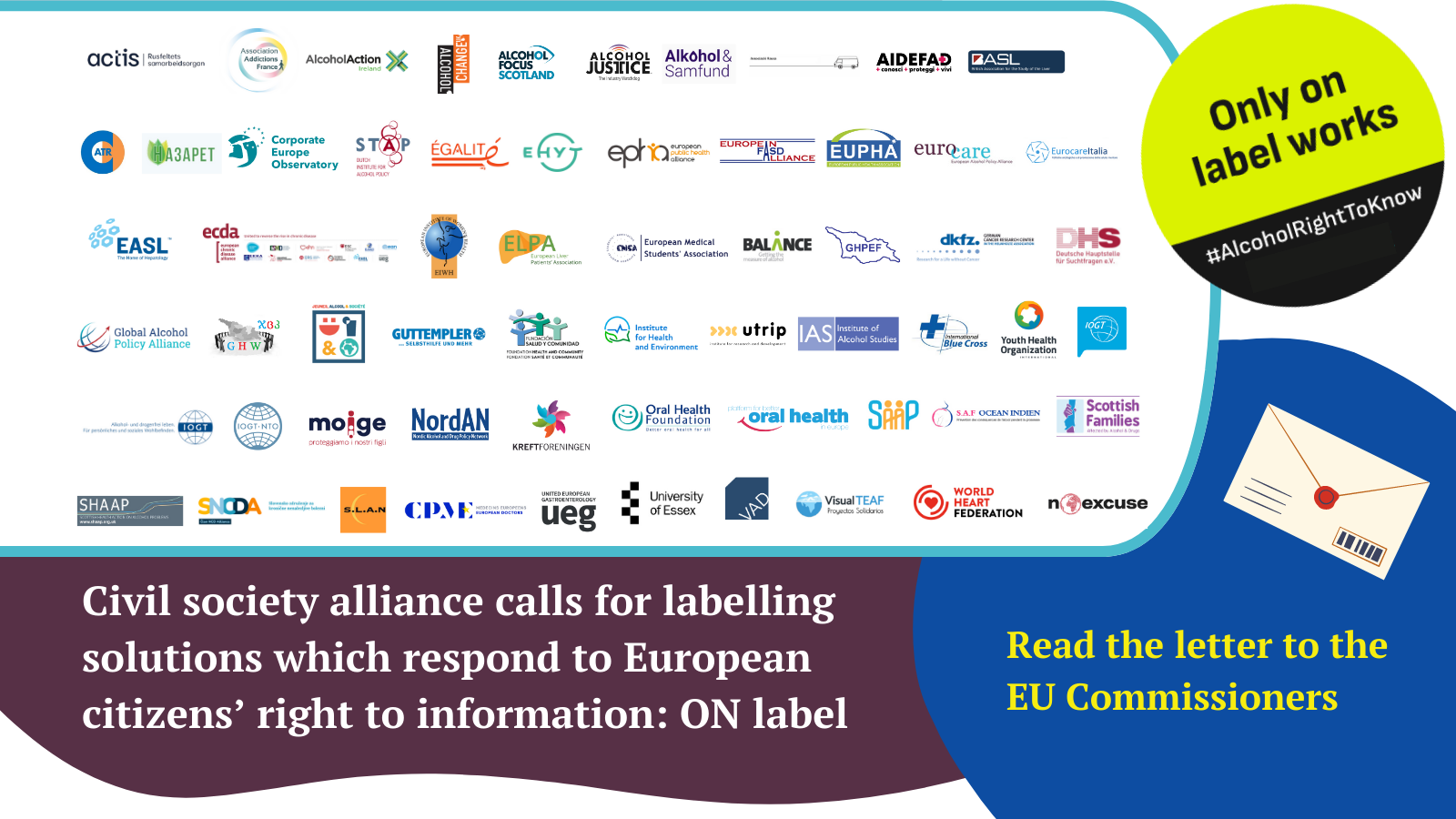PRESS RELEASE: Civil society calls on the EC to release mandatory alcohol labelling proposal immediately
A major alliance of European civil society leaders has written to senior EC officials and Commissioners to urge the bloc to respect citizens’ alcohol health information rights in a timely way.
The call was made in an open letter to senior EU figures with 68 signatures from civil society leaders from across Europe, coordinated by the European Alcohol Health Policy Alliance (Eurocare).
READ THE LETTER HERE
“Eurocare is delighted to be joined by such powerful voices in calling on the European Commission to stop being influenced by economic operators and to stand up for EU citizens’ right to basic alcohol health information,” said Florence Berteletti, Secretary General of Eurocare.
Unlike any other product sold in the EU, alcoholic beverages containing more than 1.2% of alcohol by volume are not required to give calorie information or list their ingredients on their labels. The Commission has already acknowledged the absence of any objective rationale for this exemption in a late report from 2017 to the European Parliament and the Council.
According to the Beating Cancer Plan, the proposal was expected to be adopted within the Commission by the end of 2022. It is already 6 months overdue.
The coalition’s letter argues that health information must appear ON the labels to effectively reach consumers and seeks reassurance that a forthcoming European Commission proposal on alcohol labelling will not be unduly influenced or further delayed by commercial operators.
Alcohol is the causal factor for more than 200 diseases and conditions, classified by the International Agency for Research on Cancer (IARC) as a Group 1 human carcinogen since 1982.
NOTES TO JOURNALISTS:
• In its Europe's Beating Cancer plan, published in February 2021, the European Commission suggests – among other initiatives concerning cancer prevention – several actions concerning alcoholic beverages, such as limiting online advertising and promotion, and reviewing European Union (EU) legislation on the taxation of alcohol. Also among the proposals is mandatory labelling of ingredients and nutrient content on alcoholic beverages by the end of 2022. Health warnings on labels should follow by the end of 2023. First attempts to label ingredients of alcoholic drinks were already made in the late 1970s, however the Council was not able to agree on any of the proposed models. Furthermore, alcoholic drinks containing more than 1.2 % by volume of alcohol (ABV) are exempted from the obligation, set on other drinks and foodstuffs, to list the ingredients and make a nutritional declaration on the label. The European Commission adopted a report in 2017, concluding that it had 'not found objective grounds that would justify' the absence of information on ingredients and nutritional information on alcoholic beverages. Following on from the Commission's report, the European associations representing the alcoholic beverages sectors presented their self-regulation proposal in March 2018, suggesting that some sectors would list all ingredients on labels, while others could use online means of communication instead. Stakeholders have differing views on the desirability and feasibility of listings on-label; some would prefer this information to be allowed to be given off-label through QR-codes, apps or websites, while others absolutely insist that alcoholic drinks should be no different from other sectors of the food and drink industry. The European Parliament has called on the European Commission to consider a health warning and calorie content on alcoholic beverage labels. This is an update of a Briefing published in April 2021.
• The European Alcohol Policy Alliance (Eurocare) : Eurocare is the only alliance of national, pan-European and international NGOs working exclusively on EU policy analysis and advocacy linked to the reduction of alcohol related harm in Europe. Member organisations are involved in advocacy and research, as well as in the provision of information and training on alcohol issues and the provision of services for people whose lives are affected by alcohol problems. Eurocare has become a recognised partner in the alcohol policy field working with the European Commission, the European Parliament, permanent representations, the OECD and the World Health Organisation. Eurocare is a not-for-profit international organisation registered in Belgium (AISBL). Eurocare and its members do not receive funding from the alcohol industry or industry-funded organisations.

